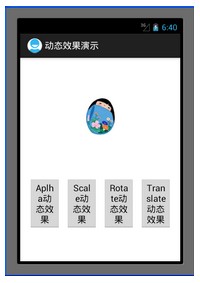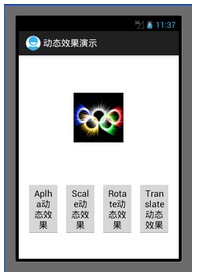android Tween Animation属性设置方法实例
在Android开发中,Animation是用来给控件制作效果的。大多数的控件都可以用这个类,这个类包含了4种基本动作,分别为移动,旋转,淡入淡出,缩放。在使用Animation时,可以在.java文件中用java代码对其进行设置,这样的优点是可以方便调试程序效果;另外一种方法就是在xml中对控件的属性做设置,好处是代码的重用性比较高,缺点是不方便调试。
一、在java代码中使用Animation
在java代码中使用Animation主要分为下面4个步骤。
创建一个AnimationSet类,AnimationSet类是一个Animation集合,里面可以许多Animation,且在AnimationSet中设置的属性适用于里面的所有Animation。
根据我们需要的动态效果创建一个Animation类,主要有4个这样的类,分别为AlphaAnimation,ScaleAnimation,RotateAnimation,TranslateAnimation,分别对应着一种动画效果。
将上面建立好的Animation设置相应的动态属性,然后加入到AnimationSet中。
最后在需要适用这个动态的效果的控件中加载这个AnimationSet。
这里,做了一个简单的实验,分别试了下上面的动态效果。实验室对一个image图标进行动态演示,下面有4个按钮,每个按钮对应一个动态演示的效果。这4中效果分别是:image图标由完全透明到完全不透明变化,持续时间为1s;image图标由原来大小尺寸沿自身尺寸中心逐渐缩放到0,持续时间为1s;image图标以自身中心为圆心旋转360度,持续时间为1s;image图标从自身位置开始同时向右和向下移动了imageView控件的宽和高长度。
界面如下所示(动态效果就不一张一张截图演示了):
在设置Animation属性的时候,有一点需要注意的是,在进行尺度缩放,平移,旋转会涉及到中心点以及移动的距离那些参数,这些参数的值的设置是需要依据它值属性来的,如果值属性为Animation.RELATIVE_TO_SELF,那么就是参考控件自身的坐标,如果是Animation.RELATIVE_TO_PARENT,那么就是参考程序界面的坐标。
Java文件代码如下:
package com.example.anim_1;
import android.app.Activity;
import android.view.View;
import android.view.View.OnClickListener;
import android.os.Bundle;
import android.view.Menu;
import android.view.animation.AlphaAnimation;
import android.view.animation.Animation;
import android.view.animation.AnimationSet;
import android.view.animation.RotateAnimation;
import android.view.animation.ScaleAnimation;
import android.view.animation.TranslateAnimation;
import android.widget.Button;
import android.widget.ImageView;
public class MainActivity extends Activity {
private ImageView image = null;
private Button alpha = null;
private Button scale = null;
private Button rotate = null;
private Button translate = null;
@Override
public void onCreate(Bundle savedInstanceState) {
super.onCreate(savedInstanceState);
setContentView(R.layout.activity_main);
image = (ImageView)findViewById(R.id.image);
alpha = (Button)findViewById(R.id.alpha);
scale = (Button)findViewById(R.id.scale);
rotate = (Button)findViewById(R.id.rotate);
translate = (Button)findViewById(R.id.translate);
alpha.setOnClickListener(new AlphaButtonListener());
scale.setOnClickListener(new ScaleButtonListener());
rotate.setOnClickListener(new RotateButtonListener());
translate.setOnClickListener(new TranslateButtonListener());
}
private class AlphaButtonListener implements OnClickListener{
public void onClick(View v) {
// TODO Auto-generated method stub
//这里设置ture参数表示共享interpolator
AnimationSet alpha_animation_set = new AnimationSet(true);
//从完全不透明到完全透明
//这里的数字后面用f难道表示浮点型?
AlphaAnimation alpha_animation = new AlphaAnimation(1.0f, 0.0f);
alpha_animation_set.addAnimation(alpha_animation);
alpha_animation.setDuration(1000);//1s钟
image.startAnimation(alpha_animation_set);
}
}
private class ScaleButtonListener implements OnClickListener{
public void onClick(View v) {
// TODO Auto-generated method stub
AnimationSet scale_animation_set = new AnimationSet(true);
//以自身为尺度缩放中心,从原大小尺寸逐渐缩放到0尺寸
ScaleAnimation scale_animation = new ScaleAnimation(1.0f, 0.0f, 1.0f, 0.0f,
Animation.RELATIVE_TO_SELF, 0.5f,
Animation.RELATIVE_TO_SELF, 0.5f);
scale_animation_set.addAnimation(scale_animation);
scale_animation.setDuration(1000);//1s钟
image.startAnimation(scale_animation_set);
}
}
private class RotateButtonListener implements OnClickListener{
public void onClick(View v) {
// TODO Auto-generated method stub
AnimationSet rotate_animation_set = new AnimationSet(true);
//以自身中心为圆心,旋转360度
RotateAnimation rotate_animation = new RotateAnimation(0, 360,
Animation.RELATIVE_TO_SELF, 0.5f,
Animation.RELATIVE_TO_SELF, 0.5f);
rotate_animation_set.addAnimation(rotate_animation);
rotate_animation.setDuration(1000);//1s钟
image.startAnimation(rotate_animation_set);
}
}
private class TranslateButtonListener implements OnClickListener{
public void onClick(View v) {
// TODO Auto-generated method stub
AnimationSet translate_animation_set = new AnimationSet(true);
//以自身为坐标系和长度单位,从(0,0)移动到(1,1)
TranslateAnimation translate_animation = new TranslateAnimation(Animation.RELATIVE_TO_SELF,
0.0f, Animation.RELATIVE_TO_SELF, 1.0f,
Animation.RELATIVE_TO_SELF, 0.0f,
Animation.RELATIVE_TO_SELF, 1.0f);
translate_animation_set.addAnimation(translate_animation);
translate_animation.setDuration(1000);//1s钟
image.startAnimation(translate_animation_set);
}
}
@Override
public boolean onCreateOptionsMenu(Menu menu) {
getMenuInflater().inflate(R.menu.activity_main, menu);
return true;
}
}
本次试验的xml布局文件代码如下:
<RelativeLayout xmlns:android="http://schemas.android.com/apk/res/android"
xmlns:tools="http://schemas.android.com/tools"
android:layout_width="match_parent"
android:layout_height="match_parent" >
<ImageView
android:id="@+id/image"
android:layout_centerHorizontal="true"
android:paddingTop="80px"
android:paddingBottom="80px"
android:layout_width="wrap_content"
android:layout_height="wrap_content"
android:src="@drawable/girl"
/>
<LinearLayout
android:id="@+id/button_group"
android:orientation="horizontal"
android:layout_width="fill_parent"
android:layout_height="fill_parent"
android:gravity="center_horizontal"
android:layout_below="@id/image"
>
<Button
android:id="@+id/alpha"
android:layout_width="wrap_content"
android:layout_height="wrap_content"
android:layout_margin="5px"
android:text="@string/alpha"
android:ems="1"
/>
<Button
android:id="@+id/scale"
android:layout_width="wrap_content"
android:layout_height="wrap_content"
android:layout_margin="5px"
android:text="@string/scale"
android:ems="1"
/>
<Button
android:id="@+id/rotate"
android:layout_width="wrap_content"
android:layout_height="wrap_content"
android:layout_margin="5px"
android:text="@string/rotate"
android:ems="1"
/>
<Button
android:id="@+id/translate"
android:layout_width="wrap_content"
android:layout_height="wrap_content"
android:layout_margin="5px"
android:text="@string/translate"
android:ems="1"
/>
</LinearLayout>
</RelativeLayout>
二、在xml文件中使用animation
在xml中使用animation,只需对xml文件中的动画属性进行设置,这样写好的一个xml文件可以被多次利用。
完成该功能步骤大概如下:
首先在res目录下新建anim目录,在anim目录里面建立xml文件,每个xml文件对应里面可以设置各种动画,可以将上面讲到的4种动画都放里面。这些xml文件的属性设置应该都在set标签下面。
在java语句中,只需要对需要动画显示的控件加载一个animation对象,该animation对象采用AnimationUtils.loadAnimation()方法来获得,该方法里面就有一个参数为anim下的一个xml,因此这个控件也就得到了相应xml里面设置的动画效果了。
这次试验的效果和第一种情况的一样,只是图片换了一张。
效果演示界面如下:

在用xml设置动态属性的时候,有些属性比如旋转中心,平移尺寸的设置,有如下规则:
如果android:pivotX=”N”,则表示绝对坐标比例,即屏幕的坐标比例。
如果android:pivotX=”N%”,则表示相对自身的坐标比例。
如果android:pivotX=”N%p”,则表示相对于父控件的坐标比例。
实验代码如下(附录有工程code下载链接):
MainActivity.java:
package com.example.anim_2;
import android.app.Activity;
import android.view.View;
import android.view.View.OnClickListener;
import android.os.Bundle;
import android.view.Menu;
import android.view.animation.Animation;
import android.view.animation.AnimationUtils;
import android.widget.Button;
import android.widget.ImageView;
public class MainActivity extends Activity {
private ImageView image = null;
private Button alpha = null;
private Button scale = null;
private Button rotate = null;
private Button translate = null;
@Override
public void onCreate(Bundle savedInstanceState) {
super.onCreate(savedInstanceState);
setContentView(R.layout.activity_main);
image = (ImageView)findViewById(R.id.image);
alpha = (Button)findViewById(R.id.alpha);
scale = (Button)findViewById(R.id.scale);
rotate = (Button)findViewById(R.id.rotate);
translate = (Button)findViewById(R.id.translate);
alpha.setOnClickListener(new AlphaButtonListener());
scale.setOnClickListener(new ScaleButtonListener());
rotate.setOnClickListener(new RotateButtonListener());
translate.setOnClickListener(new TranslateButtonListener());
}
private class AlphaButtonListener implements OnClickListener{
public void onClick(View v) {
// TODO Auto-generated method stub
Animation animation = AnimationUtils.loadAnimation(MainActivity.this, R.anim.alpha);
image.startAnimation(animation);
}
}
private class ScaleButtonListener implements OnClickListener{
public void onClick(View v) {
Animation animation = AnimationUtils.loadAnimation(MainActivity.this, R.anim.scale);
image.startAnimation(animation);
}
}
private class RotateButtonListener implements OnClickListener{
public void onClick(View v) {
Animation animation = AnimationUtils.loadAnimation(MainActivity.this, R.anim.rotate);
image.startAnimation(animation);
}
}
private class TranslateButtonListener implements OnClickListener{
public void onClick(View v) {
Animation animation = AnimationUtils.loadAnimation(MainActivity.this, R.anim.translate);
image.startAnimation(animation);
}
}
@Override
public boolean onCreateOptionsMenu(Menu menu) {
getMenuInflater().inflate(R.menu.activity_main, menu);
return true;
}
}
activity_main.xml:
<LinearLayout xmlns:android="http://schemas.android.com/apk/res/android"
xmlns:tools="http://schemas.android.com/tools"
android:layout_width="match_parent"
android:layout_height="match_parent"
android:orientation="vertical"
>
<LinearLayout
android:id="@+id/image_layout"
android:layout_width="fill_parent"
android:layout_height="250dip"
android:gravity="center"
>
<ImageView
android:id="@+id/image"
android:layout_width="wrap_content"
android:layout_height="wrap_content"
android:src="@drawable/olympic"
/>
</LinearLayout>
<LinearLayout
android:id="@+id/button_group"
android:orientation="horizontal"
android:gravity="center_horizontal"
android:layout_width="fill_parent"
android:layout_height="fill_parent"
android:layout_below="@id/image_layout"
>
<Button
android:id="@+id/alpha"
android:layout_width="wrap_content"
android:layout_height="wrap_content"
android:layout_margin="5dip"
android:text="@string/alpha"
android:ems="1"
/>
<Button
android:id="@+id/scale"
android:layout_width="wrap_content"
android:layout_height="wrap_content"
android:layout_margin="5dip"
android:text="@string/scale"
android:ems="1"
/>
<Button
android:id="@+id/rotate"
android:layout_width="wrap_content"
android:layout_height="wrap_content"
android:layout_margin="5dip"
android:text="@string/rotate"
android:ems="1"
/>
<Button
android:id="@+id/translate"
android:layout_width="wrap_content"
android:layout_height="wrap_content"
android:layout_margin="5dip"
android:text="@string/translate"
android:ems="1"
/>
</LinearLayout>
</LinearLayout>
anim/alpha.xml:
set
android:interpolator="@android:anim/accelerate_interpolator"
xmlns:android="http://schemas.android.com/apk/res/android">
<alpha
android:fromAlpha="1.0"
android:toAlpha="0.0"
android:duration="1000"
/>
</set>
anim/scale.xml:
<?xml version="1.0" encoding="utf-8"?>
<set xmlns:android="http://schemas.android.com/apk/res/android"
android:interpolator="@android:anim/accelerate_interpolator">
<scale
android:fromXScale="1.0"
android:toXScale="0.0"
android:fromYScale="1.0"
android:toYScale="0.0"
android:pivotX="50%"
android:pivotY="50%"
android:duration="1000"
/>
</set>
anim/rotate.xml:
<?xml version="1.0" encoding="utf-8"?>
<set xmlns:android="http://schemas.android.com/apk/res/android"
android:interpolator="@android:anim/accelerate_interpolator"
>
<rotate
android:fromDegrees="0"
android:toDegrees="360"
android:pivotX="50%"
android:pivotY="50%"
android:duration="1000"
/>
</set>
anim/translate.xml:
<?xml version="1.0" encoding="utf-8"?>
<set xmlns:android="http://schemas.android.com/apk/res/android">
android:interpolator="@android:anim/accelerate_interpolator"
>
<translate
android:fromXDelta="0%"
android:toXDelta="100%"
android:fromYDelta="0%"
android:toYDelta="100%"
android:duration="1000"
/>
</set>
总结:本次实验主要讲android中animation这个类对控件的动画效果设置,对用java代码和用xml代码2种方式都做了个简单的实验。懂得其使用方法的大体流程。
作者:tornadomeet





